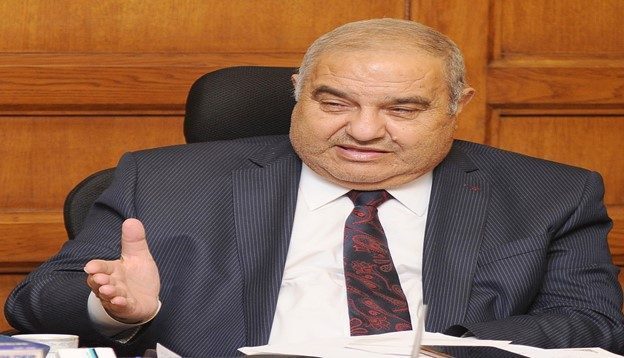
The head of Egypt’s Supreme Constitutional Court has sent a message to human rights advocates to stay silent.
“Stay silent, it is better for you. Egypt is a leading nation in respecting human rights,” Counsellor Said Marei told a TV station in Egypt.
Marei said that Egypt’s Abdel Fattah Al-Sisi respected women and had worked hard to advocate for women’s rights including appointing them to the state council and the public prosecution.
Whoever visits Egypt and the ancient temples will find the symbol of justice on the wall, he added.
On Twitter, Mamdouh Ismail said: The head of the Supreme Constitutional Court, Said Marei, shamelessly says to those who criticize human rights violations in Egypt (Stay silent)! If you are not ashamed practice hypocrisy as you wish.
Ismail added: This confirms the corruption of the judiciary in Egypt and that you were appointed to your position based on hypocrisy. But we will not be silent about injustice, fabrication, politicized judiciary, and tens of thousands of the oppressed in Egypt. Injustice will never last.
In the interview with Al-Nahar, Marei added that the Egyptian judiciary is independent, painting a very different picture of Egypt to what has been widely documented by rights advocates.
There are roughly 65,000 political prisoners in the country who are systematically tortured, denied healthcare and served with death sentences at an alarming rate.
Officials in the country have consistently denied there is a human rights crisis, even denying that there are political prisoners.
Throat cut
The comments are reminiscent of a warning issued by Egypt’s Immigration Minister Nabila Makram in 2019 who said during a private party with expats in Canada:
“Anyone who says anything about our country, what happens to them? We cut,” she added, making a slicing motion across her throat.
In August a cleric claimed Egypt’s prisons are like resorts where prisoners are treated like guests after a report held the Tora Prison authorities responsible for the death of political prisoner Tjuddin Abdel-Qader Allam.
Critics have said that Egypt’s attempts to employ more women into the administration are surface changes only, since hundreds of women have reported being sexually and verbally abused by authorities, particularly during their arrest or incarceration.
At the same time the government has introduced archaic legislation which could see a woman’s marriage annulled by a male member of her family if he doesn’t approve.
In June, detained Egyptian activist Alaa Abdelfattah called on Egypt’s judiciary to stand down, accusing the authorities of subordination to the authorities and failing to issue independent rulings.
According to Egyptian law, someone can only be held in pretrial detention for a maximum of two years, however courts regularly bring new charges against political prisoners when they reach the end of this time to prolong their detention.
Abuse of rights defenders
Human rights defenders held incommunicado, face spurious charges, says UN expert.
In mid July 2021. a UN expert, Mary Lawlor, expressed dismay at the continued widespread arrest and extended pre-trial detention of human rights defenders in Egypt, saying activists have been detained without warrants, held incommunicado and then accused of multiple spurious offences.
“Exercising one’s right to freedom of expression, association or peaceful assembly is not a crime. Everyone has the right to promote and protect human rights. There is no justification for the actions being taken against human rights defenders by the Egypt authorities,” said Mary Lawlor, UN Special Rapporteur on the situation of human rights defenders.
This is the second time this year that Lawlor has addressed the targeting of human rights defenders in Egypt.
“In January 2021, I expressed my dismay at the misuse of anti-terrorism and national security laws to criminalise the work of human rights defenders in the country. Since then, more defenders have been placed in pre-trial detention under investigation for crimes under these provisions, which carry aggravated sentences. Many of those who were detained continue to be held in deplorable conditions in prison with seriously negative impacts on their physical and mental health.”
Lawlor highlighted a common trend across multiple cases she recently raised with the Egyptian Government, whereby human rights defenders are often arrested without a warrant and detained incommunicado at an unknown location and subjected to enforced disappearance, before being presented before the Supreme State Security Prosecution.
Their pre-trial detention pending investigation is then ordered for alleged acts criminalized under the vague provisions of the Penal Code, Anti-Terror Law and Anti-Cybercrime Law.
“While initially placed in pre-trial detention for periods of 15 days, human rights defenders routinely see their detention renewed thereafter, with these periods of detention without trial commonly stretching to two years.”
During this period, Lawlor stressed human rights defenders are at high risk of being attached to new cases for alleged crimes under the same legislation, a practice particularly common in instances where human rights defenders have seen their release ordered by courts.
“This practice of attaching human rights defenders to multiple spurious cases, in some instances in parallel, represents the flagrant disregard by Egypt of the international human rights obligations it has signed up to. It is a practice designed to prevent defenders from promoting human rights in the country and it spreads a chilling effect among civil society.
“I urge the Egyptian authorities to re-think their approach to human rights defenders and to take steps to ensure the national framework of criminal and anti-terrorism provisions is not employed to target them.”
Lawlor stressed the vital role civil society plays in Egypt and ensured that she will continue to follow up on cases of detained human rights defenders brought to her attention, and called for the immediate release of some individuals, including:
- Mr. Mohamed Ramadan, human rights defender and lawyer
- Mr. Mohamed El-Baqer, human rights defender and lawyer
- Mr. Ezzat Ghoneim, human rights defender and lawyer, director of Egyptian Coordination for Rights and Freedoms (ECRF)
- Ms. Aisha El Shater, human rights defender and ECRF board member
- Mr. Mohamed Abo Horira, human rights defender and ECRF board member
- Ms. Huda Abdel Moneim, human rights defender and ECRF board member
- Mr. Ibrahim Ezz El-Din, human rights defender and researcher
- Mr. Ramy Kamel Saied Salib, human rights defender and head of Maspero Youth Foundation
- Ms. Mahienour El-Masry, human rights defender and lawyer
- Mr. Amr Imam, human rights defender and lawyer at the Arabic Network for Human Rights Information
- Mr. Walid Ali Saleim Mohammed Hamada, human rights defender and lawyer
Finally, Lawlor highlighted the vital role that civil society plays and how the Egyptian authorities must ensure an open, secure and safe environment that is free from all acts of intimidation, harassment and reprisals.



